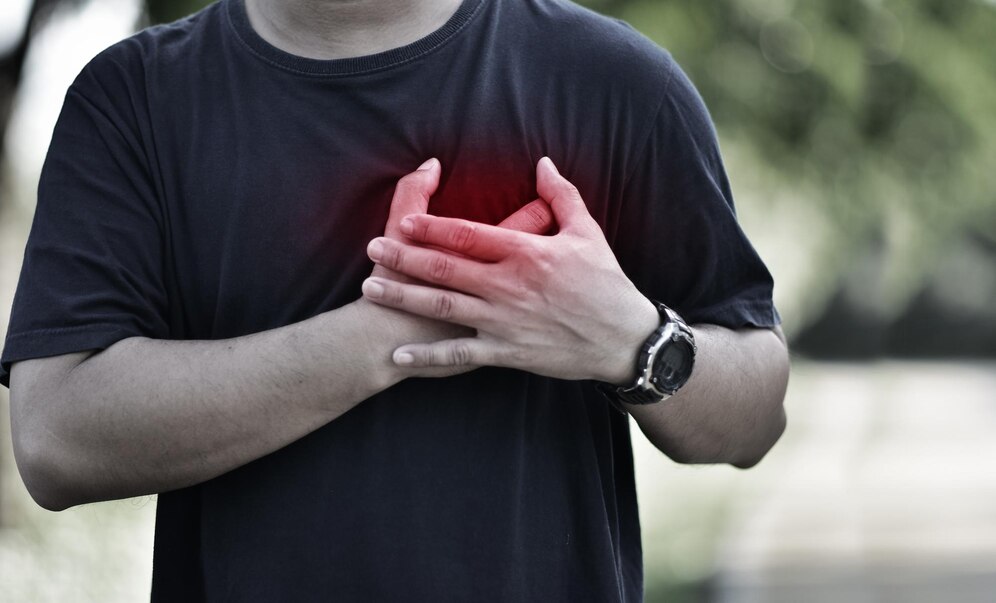Heart palpitations, that unpleasant fluttering or racing sensation in your chest, can be a cause for concern. They can be alarming, especially if they come on suddenly or feel intense. The good news is that in most cases, heart palpitations are harmless. However, understanding the underlying causes and treatment options is crucial to ensure your heart health. This blog explores the common causes, symptoms, and diagnosis of heart palpitations, along with treatment strategies including both medications and natural approaches.
Feeling Your Heart Flutter? Understanding Heart Palpitations
Heart palpitations can manifest in various ways. You might feel:
- A fluttering sensation in your chest
- A racing heartbeat
- Skipped beats
- Pounding in your chest
- Extra heartbeats

These sensations can last for a few seconds or persist for longer durations. They can occur occasionally or become frequent and bothersome.
When to Seek Medical Attention
While most heart palpitations are not a cause for serious concern, seeking medical attention is important if you experience any of the following alongside your palpitations:
- Chest pain or tightness
- Shortness of breath
- Dizziness or light-headedness
- Fainting (syncope)
- Difficulty breathing
- Sweating
- Anxiety or a feeling of impending doom
These symptoms could indicate an underlying heart condition requiring prompt medical evaluation.

Common Causes of Heart Palpitations
Heart palpitations can arise from various factors, both related and unrelated to the heart itself. Here’s a breakdown of some common culprits:
Stress and Anxiety: Emotional stress and anxiety are frequent triggers for heart palpitations. The release of stress hormones like adrenaline can cause your heart rate and force of contraction to increase, leading to a fluttering or racing sensation.
Panic Attacks: During a panic attack, the sudden surge of intense fear and anxiety can mimic a heart attack, including heart palpitations, shortness of breath, and chest pain.
Thyroid Problems: An overactive thyroid gland (hyperthyroidism) can cause an increased heart rate and palpitations. Conversely, an underactive thyroid (hypothyroidism) can also contribute to palpitations in some cases.
Dehydration: Dehydration can lead to a decrease in blood volume, causing your heart to work harder to circulate blood effectively. This can manifest as heart palpitations.
Electrolyte Imbalances: Electrolytes like potassium, magnesium, and calcium play a crucial role in heart function. Imbalances in these electrolytes can disrupt the heart’s electrical signals, leading to irregular heartbeats and palpitations.
Caffeine and Alcohol: Excessive consumption of caffeine or alcohol can stimulate the heart and cause palpitations.
Certain Medications: Some medications, including decongestants, asthma medications, antidepressants, and some heart medications themselves, can have heart palpitations as a side effect.
Illegal Drugs: Stimulant drugs like cocaine and amphetamines can significantly increase heart rate and cause palpitations.
Medical Conditions: Certain medical conditions, such as anemia, low blood sugar (hypoglycemia), and fever, can put stress on the heart and lead to palpitations.
Hormonal Changes: Women may experience heart palpitations during menstruation, pregnancy, or menopause due to hormonal fluctuations.

Shortness of Breath and Heart Palpitations:
Sometimes, heart palpitations can occur alongside shortness of breath. This can be particularly alarming. While this combination can sometimes indicate an underlying heart condition, it can also arise from anxiety or panic attacks. If you experience both symptoms together, especially if they are new or severe, consulting a healthcare professional is crucial for proper diagnosis.
High Blood Pressure and Heart Palpitations:
High blood pressure (hypertension) is not a direct cause of heart palpitations. However, longstanding, uncontrolled hypertension can damage the heart muscle and electrical system over time, potentially leading to arrhythmias (irregular heartbeats) that can manifest as palpitations.
Heart Palpitations Caused by Medication:
Certain medications, as mentioned earlier, can list heart palpitations as a side effect. If you suspect your medication might be causing your palpitations, discuss it with your doctor. They can help determine if adjusting the dosage, switching medications, or addressing the underlying condition for which the medication is prescribed is the best course of action.

Diagnosing Heart Palpitations and Exploring Treatment Options:
Diagnosing Heart Palpitations:
Accurately diagnosing the cause of your heart palpitations is key to developing an appropriate treatment plan. Your doctor will likely inquire about your medical history, current medications, lifestyle habits, and the nature of your palpitations.
Here are some diagnostic tools commonly used:
Electrocardiogram (ECG): This non-invasive test measures the electrical activity of your heart, providing insights into heart rhythm and potential irregularities.
Holter Monitor: A portable device worn for 24 to 48 hours that continuously records your heart rhythm, allowing your doctor to detect palpitations that might not occur during a standard ECG.
Event Recorder: This small, portable device is worn for a longer period (weeks or months) and can be activated manually when you experience palpitations, capturing the heart rhythm during those specific episodes.
Echocardiogram (Echo): This painless ultrasound exam creates images of your heart structure and function, allowing your doctor to identify any underlying heart abnormalities.
Blood Tests: Blood tests may be ordered to check for thyroid hormone levels, electrolyte imbalances, anemia, or other medical conditions that could contribute to palpitations.
Treatment Options for Heart Palpitations
The treatment approach for heart palpitations depends on the underlying cause. Here’s a breakdown of common treatment strategies:
Addressing Underlying Conditions:
If an underlying medical condition like hyperthyroidism or anemia is identified as the culprit, treating that condition will often alleviate the palpitations.
Managing stress and anxiety can significantly reduce palpitations triggered by these emotions. Techniques like relaxation therapy, meditation, and deep breathing exercises can be helpful.
Medication:
Beta-blockers are a class of medications commonly prescribed to control heart rate and reduce the force of contractions, effectively alleviating palpitations. Antiarrhythmic medications work by regulating the heart’s electrical system and preventing irregular heartbeats. Medications may also be prescribed to address underlying conditions contributing to palpitations, such as thyroid medication for hyperthyroidism.
Natural Approaches:
In some cases, natural approaches can complement conventional treatment or potentially be effective on their own for mild palpitations. Here are some options to consider, but always discuss them with your doctor before implementing them:
Magnesium: Magnesium deficiency can contribute to palpitations. Increasing dietary magnesium intake or taking magnesium supplements may be beneficial.
Coenzyme Q10 (CoQ10): This antioxidant supports heart health and may improve symptoms in some cases.
Herbal Remedies: Certain herbs, like chamomile and hawthorn berry, have properties that may promote relaxation and potentially reduce palpitations. However, herbs can interact with medications, so consulting your doctor is crucial before starting any herbal remedies.
Lifestyle Modifications:
Healthy lifestyle habits can significantly reduce the frequency and severity of heart palpitations:
Maintain a healthy weight: Obesity puts stress on the heart and can contribute to palpitations.
Eat a heart-healthy diet: A diet rich in fruits, vegetables, whole grains, and low in saturated fat and processed foods promotes overall cardiovascular health.
Limit caffeine and alcohol: Excessive consumption of these substances can trigger palpitations.
Exercise regularly: Regular physical activity strengthens the heart and improves its overall function.
Manage stress effectively: Chronic stress is a common trigger for palpitations. Finding healthy ways to manage stress, such as relaxation techniques or exercise, is crucial.
Get enough sleep: Aim for 7-8 hours of quality sleep each night. Sleep deprivation can disrupt heart rhythm and contribute to palpitations.
Conclusion:
Heart palpitations can be a cause for concern, but in most cases, they are harmless. By understanding the potential causes, seeking medical evaluation when necessary, and exploring appropriate treatment options through medication, natural approaches, and lifestyle modifications, you can effectively manage your heart palpitations and maintain good heart health. If you experience frequent or bothersome palpitations, remember, it’s always best to consult your doctor for a proper diagnosis and personalized treatment plan.





